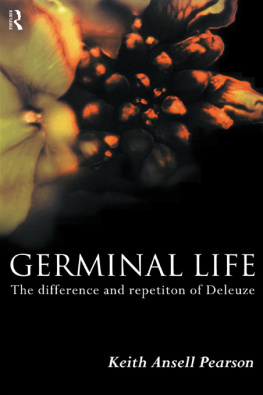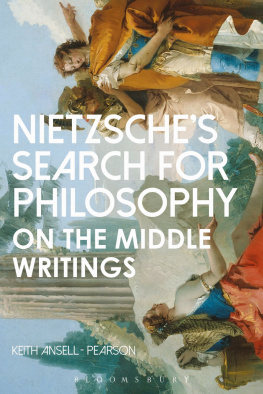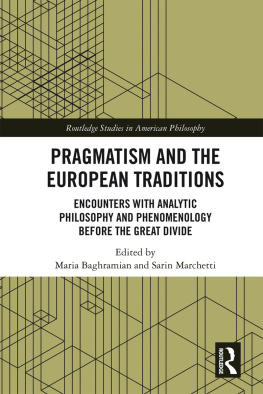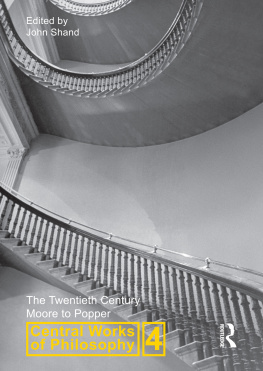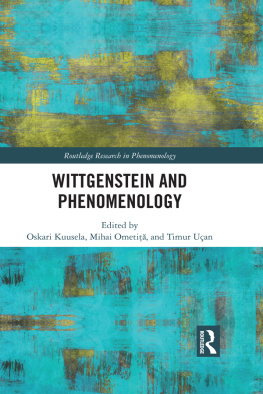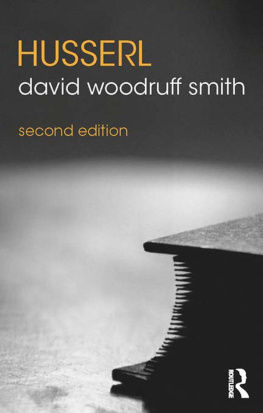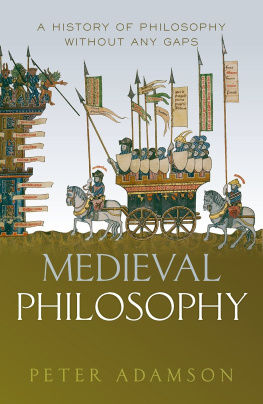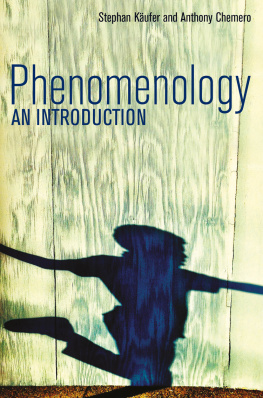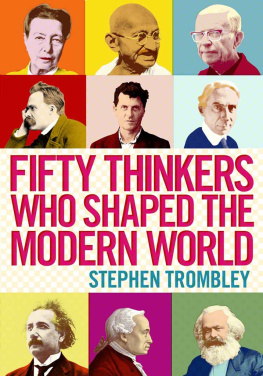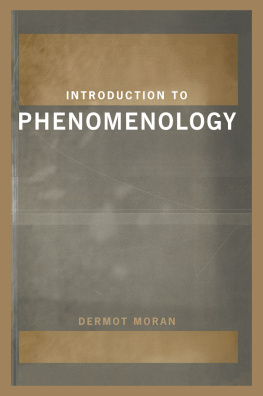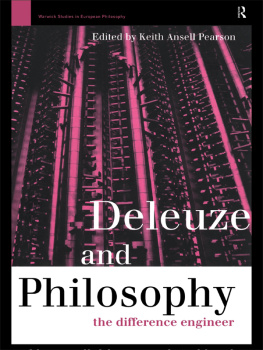THE NEW CENTURY
THE HISTORY OF CONTINENTAL PHILOSOPHY
General Editor: Alan D. Schrift
1. Kant, Kantianism, and Idealism: The Origins of Continental Philosophy
Edited by Thomas Nenon
2. Nineteenth-Century Philosophy:
Revolutionary Responses to the Existing Order
Edited by Alan D. Schrift and Daniel Conway
3. The New Century: Bergsonism, Phenomenology, and Responses to Modern Science
Edited by Keith Ansell-Pearson and Alan D. Schrift
4. Phenomenology: Responses and Developments
Edited by Leonard Lawlor
5. Critical Theory to Structuralism: Philosophy, Politics, and the Human Sciences
Edited by David Ingram
6. Poststructuralism and Critical Theorys Second Generation
Edited by Alan D. Schrift
7. After Poststructuralism: Transitions and Transformations
Edited by Rosi Braidotti
8. Emerging Trends in Continental Philosophy
Edited by Todd May
THE NEW CENTURY
BERGSONISM, PHENOMENOLOGY, AND RESPONSES TO MODERN SCIENCE
Edited by Keith Ansell-Pearson and Alan D. Schrift
VOLUME 3
THE HISTORY OF CONTINENTAL PHILOSOPHY
General Editor: Alan D. Schrift
First published in 2010 by Acumen
First published in paperback by Acumen in 2013
Published 2014 by Routledge
2 Park Square, Milton Park, Abingdon, Oxon OX14 4RN
711 Third Avenue, New York, NY 10017, USA
Routledge is an imprint of the Taylor & Francis Group, an informa business
Editorial matter and selection, 2010 Keith Ansell-Pearson and Alan D. Schrift.
Individual contributions, the contributors.
This book is copyright under the Berne Convention.
No reproduction without permission.
All rights reserved. No part of this book may be reprinted or reproduced or utilised in any form or by any electronic, mechanical, or other means, now known or hereafter invented, including photocopying and recording, or in any information storage or retrieval system, without permission in writing from the publishers.
Notices
Practitioners and researchers must always rely on their own experience and knowledge in evaluating and using any information, methods, compounds, or experiments described herein. In using such information or methods they should be mindful of their own safety and the safety of others, including parties for whom they have a professional responsibility.
To the fullest extent of the law, neither the Publisher nor the authors, contributors, or editors, assume any liability for any injury and/or damage to persons or property as a matter of products liability, negligence or otherwise, or from any use or operation of any methods, products, instructions, or ideas contained in the material herein.
ISBN 13: 978-1-84465-611-0 (pbk)
British Library Cataloguing-in-Publication Data
A catalogue record for this book is available from the British Library.
Typeset in Minion Pro.
CONTENTS
KEITH ANSELL-PEARSON
JOHN MULLARKEY
SEBASTIAN LUFT AND FABIEN CAPEILLRES
MIKE GANE
MICHAEL FRIEDMAN AND THOMAS RYCKMAN
THOMAS NENON
DAN ZAHAVI
MIGUEL DE BEISTEGUI
LEONARD H. EHRLICH
DIANE PERPICH
BABETTE BABICH
JOHN FENNELL AND BOB PLANT
ADRIAN JOHNSTON
KEITH ANSELL-PEARSON, PAUL-ANTOINE MIQUEL, AND MICHAEL VAUGHAN
Continental philosophy is itself a contested concept. For some, it is understood to be any philosophy aft er 1780 originating on the European continent (Germany, France, Italy, etc.). Such an understanding would make Georg von Wright or Rudolf Carnap respectively, a Finnish-born philosopher of language and a German-born logician who taught for many years in the US a continental philosopher, an interpretation neither they nor their followers would easily accept. For others, continental philosophy refers to a style of philosophizing, one more attentive to the world of experience and less focused on a rigorous analysis of concepts or linguistic usage. In this and the accompanying seven volumes in this series, continental philosophy will be understood historically as a tradition that has its roots in several different ways of approaching and responding to Immanuel Kants critical philosophy, a tradition that takes its definitive form at the beginning of the twentieth century as the phenomenological tradition, with its modern roots in the work of Edmund Husserl. As such, continental philosophy emerges as a tradition distinct from the tradition that has identified itself as analytic or Anglo-American, and that locates its own origins in the logical analyses and philosophy of language of Gottlob Frege. Whether or not there is in fact a sharp divergence between the work of Husserl and Frege is itself a contested question, but what cannot be contested is that two distinct historical traditions emerged early in the twentieth century from these traditions respective interpretations of Husserl (and Heidegger) and Frege (and Russell). The aim of this history of continental philosophy is to trace the developments in one of these traditions from its roots in Kant and his contemporaries through to its most recent manifestations. Together, these volumes present a coherent and comprehensive account of the continental philosophical tradition that offers readers a unique resource for understanding this traditions complex and interconnected history.
Because history does not unfold in a perfectly linear fashion, telling the history of continental philosophy cannot simply take the form of a chronologically organized series of great thinker essays. And because continental philosophy has not developed in a vacuum, telling its history must attend to the impact of figures and developments outside philosophy (in the sciences, social sciences, mathematics, art, politics, and culture more generally) as well as to the work of some philosophers not usually associated with continental phil osophy. Such a series also must attend to significant philosophical movements and schools of thought and to the extended influence of certain philosophers within this history, either because their careers spanned a period during which they engaged with a range of different theorists and theoretical positions or because their work has been appropriated and reinterpreted by subsequent thinkers. For these reasons, the volumes have been organized with an eye toward chronological development but, in so far as the years covered in each volume overlap those covered in the subsequent volume, they have been organized as well with the aim of coordinating certain philosophical developments that intersect in a fashion that is not always strictly chronological.
Volume 1 begins with the origins of continental philosophy in Kant and the earliest responses to his critical philosophy, and presents an overview of German idealism, the major movement in philosophy from the late eighteenth to the middle of the nineteenth century. In addition to Kant, the period covered in the first volume was dominated by Fichte, Schelling, and Hegel, and together their work influenced not just philosophy, but also art, theology, and politics. This volume thus covers Kants younger contemporary Herder, and his readers Schiller and Schlegel who shaped much of the subsequent reception of Kant in art, literature, and aesthetics; the Young Hegelians including Bruno Bauer, Ludwig Feuerbach, and David Friedrich Strauss whose writings would influence Engels and Marx; and the tradition of French utopian thinking in such figures as Saint-Simon, Fourier, and Proudhon. In addition to Kants early critics Jacobi, Reinhold, and Maimon significant attention is also paid to the later critic of German idealism Arthur Schopenhauer, whose appropriation and criticism of theories of cognition later had a decisive influence on Friedrich Nietzsche.


